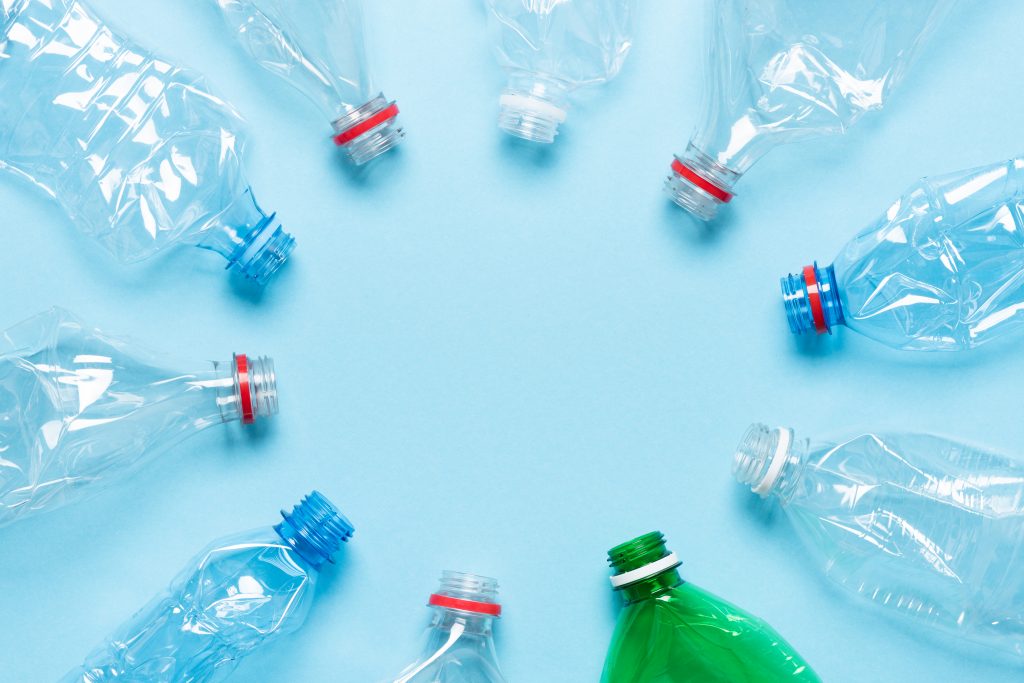The India-Norway cooperation project on capacity building for reducing plastic and chemical pollution in India (INOPOL) is a collaboration project between Indian and Norwegian institutions with the objective to build knowledge and capacity to reduce plastic and chemical pollution from major sources within industry, public sector, and civil society in India. The INOPOL project was led by the Norwegian Institute for Water Research (NIVA) with Mu Gamma Consultants Pvt. Ltd. (MGC) as India Lead, and Central Institute of Petrochemicals Engineering and Technology (CIPET), The Energy and Resources Institute (TERI), SRM Institute of Science and Technology (SRMIST) and Toxics Link as other collaborators. The project addressed the highly interlinked challenges of marine litter, microplastics and Persistent Organic Pollutants (POPs), with the overarching goals of enhancing capacity to reduce marine litter and microplastic pollution in Gujarat state and building capacity to reduce releases of plastic wastes and POPs in India by supporting the implementation of the Stockholm Convention (SC).
Project Partners
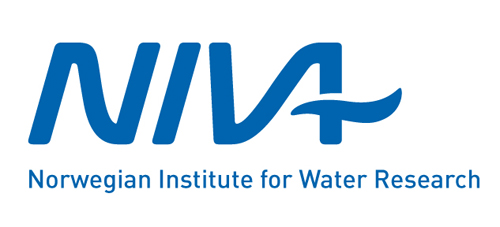
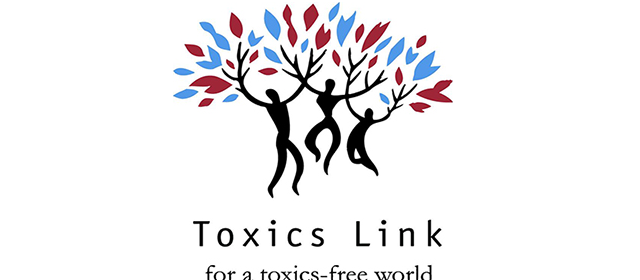

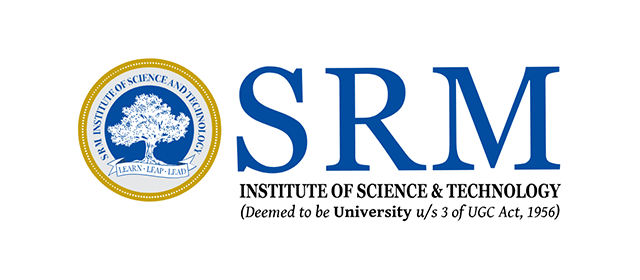
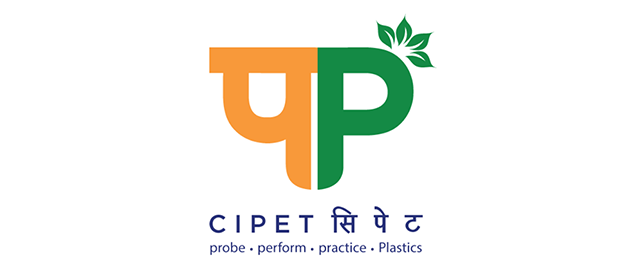
Project Overview
Press Release
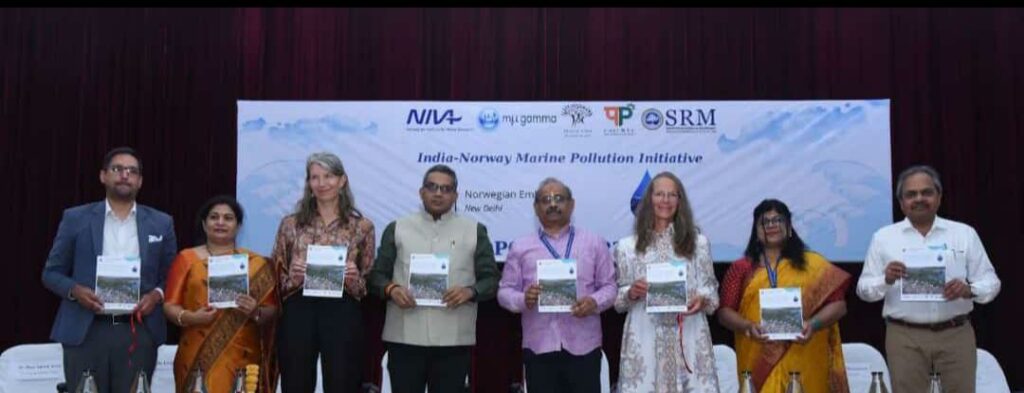
Plastic waste generation in India has more than doubled over the past five years, and managing plastic waste has become a critical challenge due to the widespread applications of plastics and lack of awareness and access to disposal options. The knowledge gaps in plastic waste management result in a large amount of plastic waste being deposited in the environment and in oceans which create challenges related to microplastics, macroplastics and hazardous chemicals such as persistent organic pollutants (POPs).
In this context, the collaborative project between India and Norway entitled ‘India-Norway cooperation project for plastic and chemical pollution reduction in India’ (INOPOL) started with Phase II to be implemented in Tamil Nadu and Uttarakhand. As part of this project, knowledge, and capacity will be built amongst different stakeholders, such as scientists and experts at the State Pollution Control Boards, research & academic organizations, and Civil Society Organizations to help reduce the releases and impacts of plastic pollution and the ‘new’ POPs listed under the Stockholm Convention, which India has recently ratified. The project aims to generate coherent data on the levels of macroplastics, microplastics, and POPs in different matrices such as water, soil, sediment, and biota in the riverine and marine environments of selected river(s) in Tamil Nadu. This project is being implemented by a team of international experts from the Norwegian Institute of Water Research (NIVA), and leading institutions in India (Mu Gamma, SRMIST, CIPET, Toxics Link)
INOPOL I, implemented in Gujarat, India, identified key action points related to persistent organic pollutants (POPs) and plastic waste following a comprehensive investigation into the impact of plastic wastes and POPs in the area surrounding the two rivers Tapi and Daman Ganga. The INOPOL II opening and kick-off meeting in Tamil Nadu was held on 9 June 2023 at the SRMIST campus in Kattankulathur.
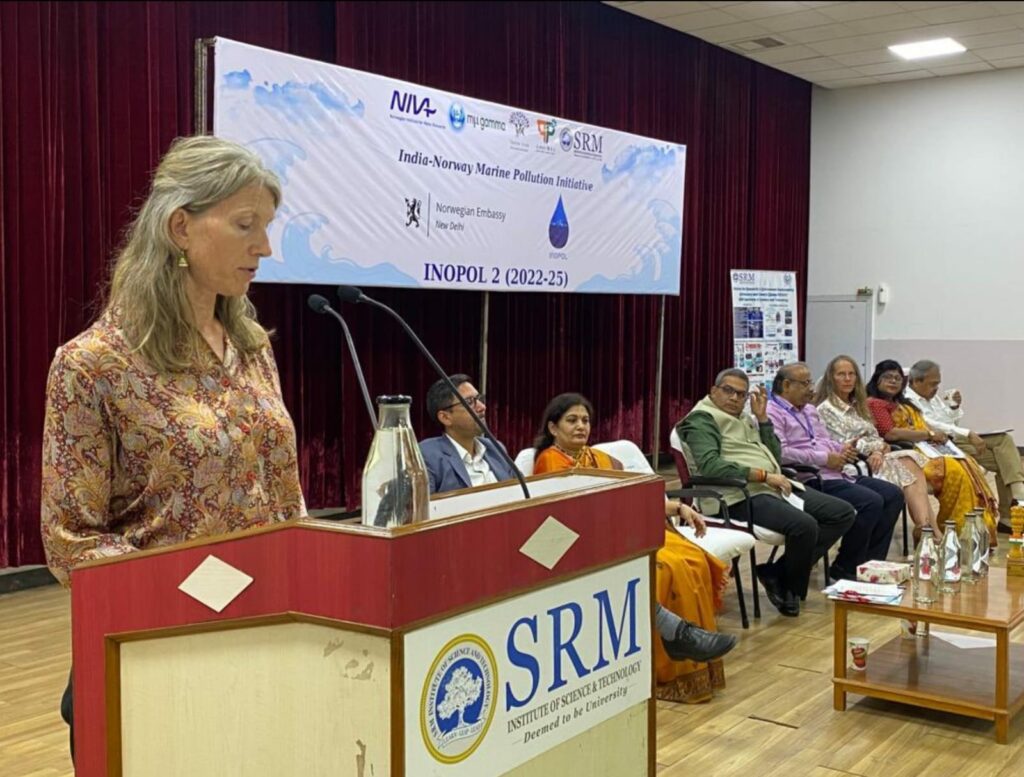
A welcome address was delivered by Dr. Marianne Olsen, Research Director, Norwegian Institute for Water Research (NIVA). Introduction to the INOPOL Phase I was given by Dr. Girija Bharat, Managing Director, Mu Gamma and Phase II of the project was detailed by Dr. Hans Nicolai Adam, Sr Research Scientist, NIVA. Chief Guest of the day, Prof. Shishir Sinha, Director General of the Central Institute for Petrochemicals Engineering and Technology (CIPET), listed concrete statistics about the challenges posed by plastic waste and shared a positive outlook about the potential value addition from plastic waste and how opportunities associated with plastic management can be inculcated in young minds.
The project is lead by the Norwegian Institute for Water Research (NIVA) and the project is implemented by Mu Gamma (MGC), SRM Institute of Science & Technology (SRMIST), Toxics Link (TL), and the Central Institute of Petrochemicals Engineering & Technology (CIPET). The project is funded by the Royal Norwegian Embassy in New Delhi and anchored with the Ministry of Environment, Forest and Climate Change (MoEFCC), Government of India.
Reports
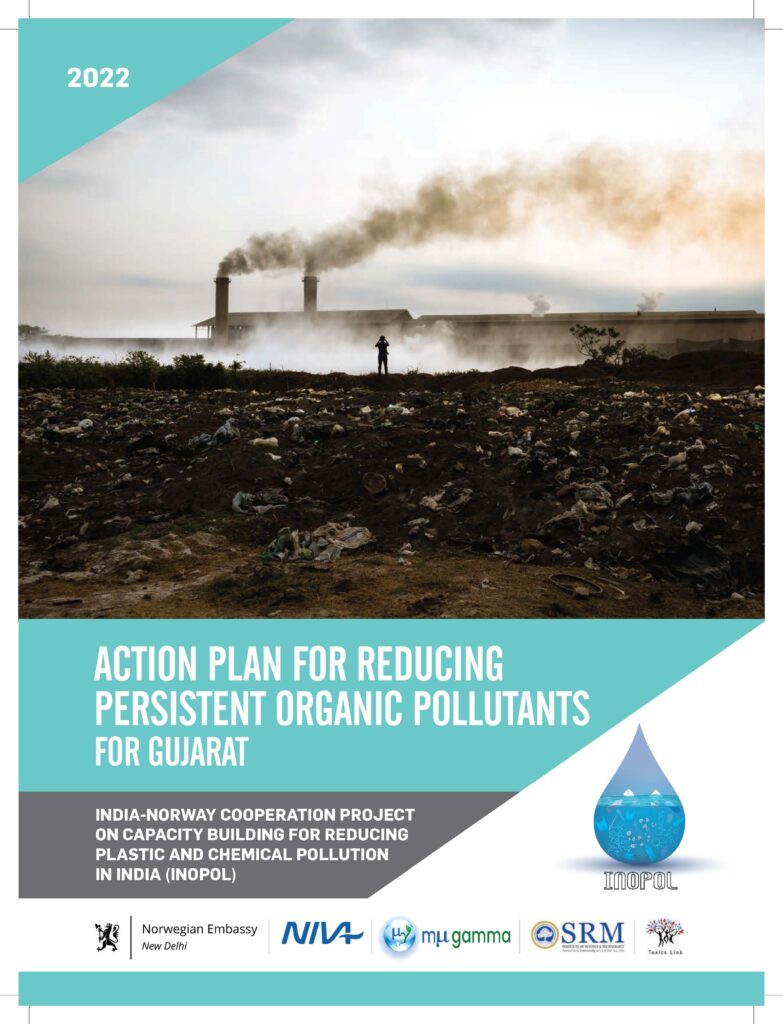
Action Plan for Reducing Persistent Organic Pollutants for Gujarat
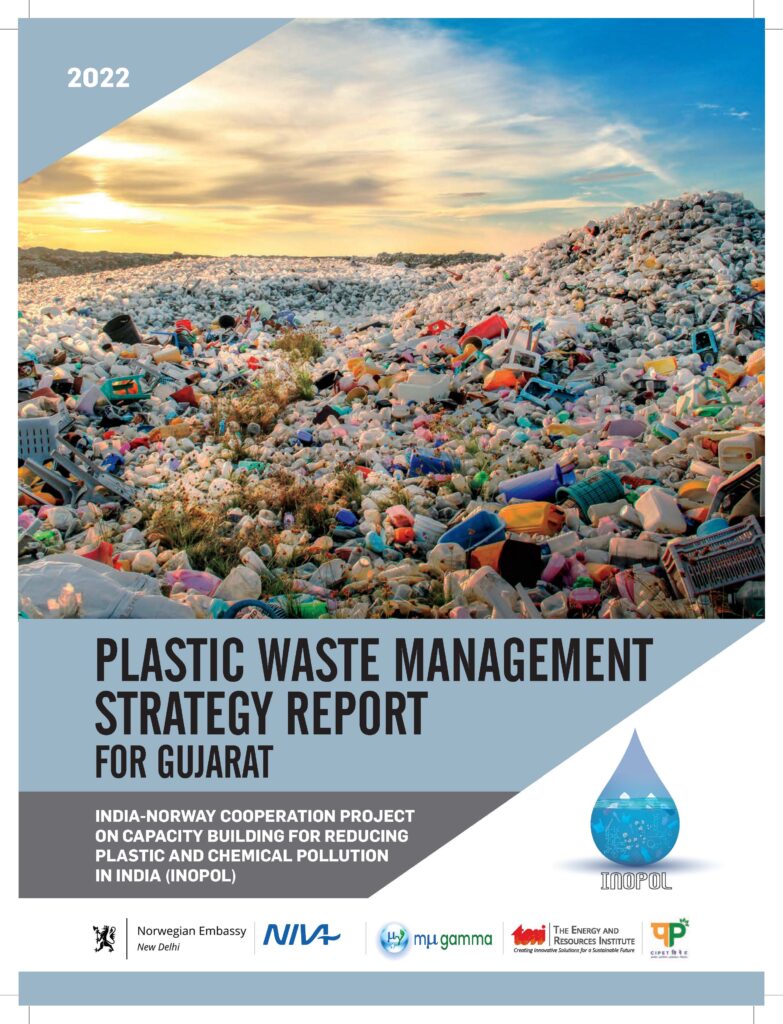
Plastic Waste Management Strategy Report for Gujarat
Baseline Reports
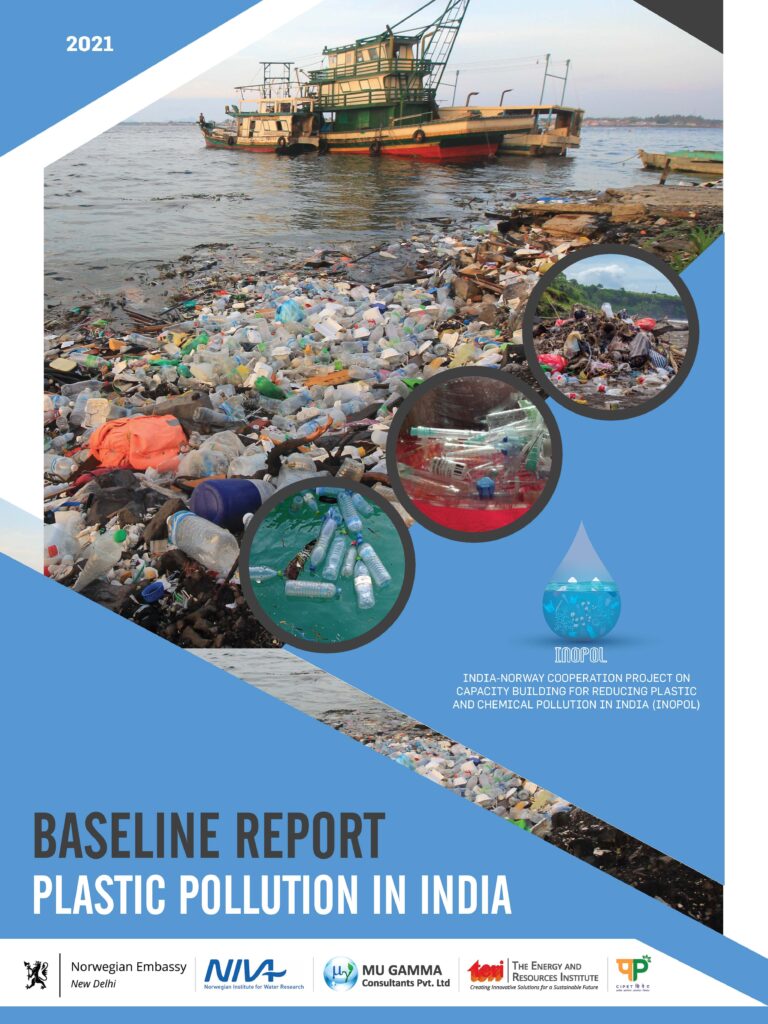
Baseline Report on Plastic Pollution in India (INOPOL 2021)
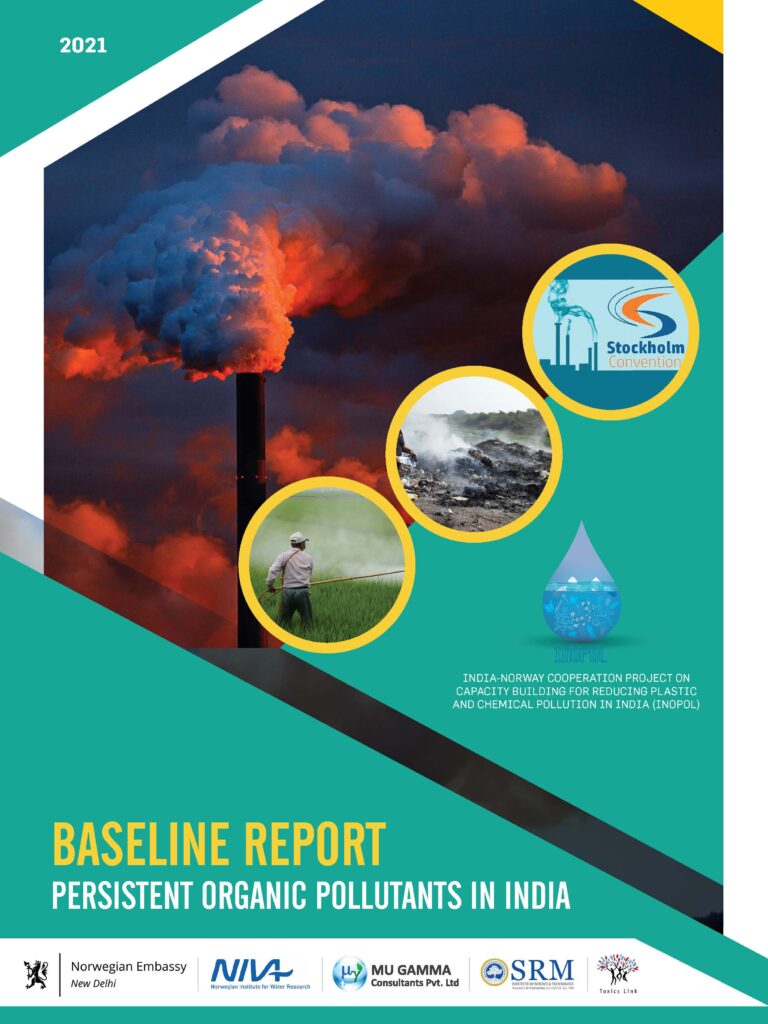
Baseline Report on Persistent Organic Pollutants in India (INOPOL 2021)
Summary Reports
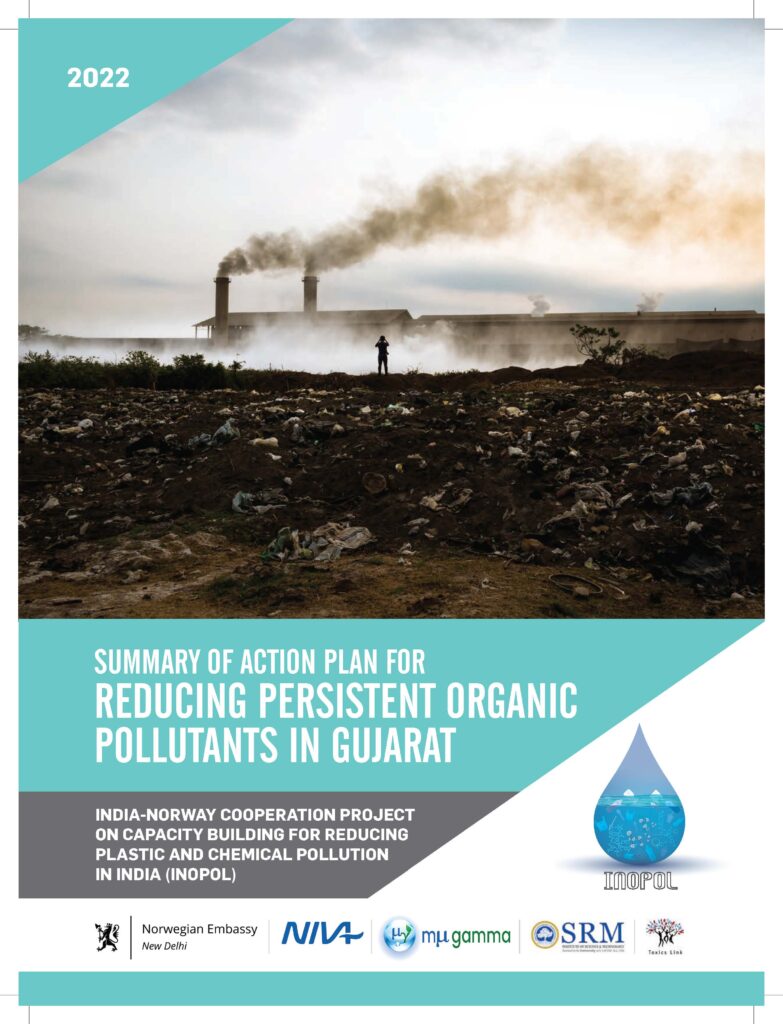
Summary of Action Plan for Reducing Persistent Organic Pollutants in Gujarat
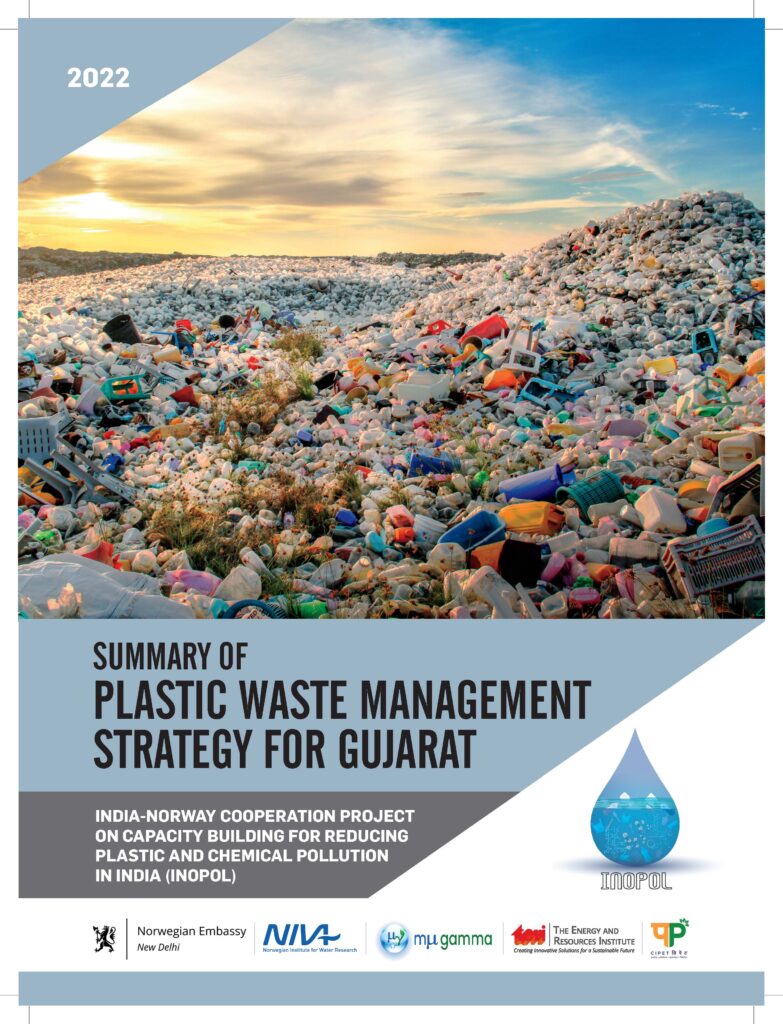
Summary of Plastic Waste Management for Gujarat
Pilot Studies
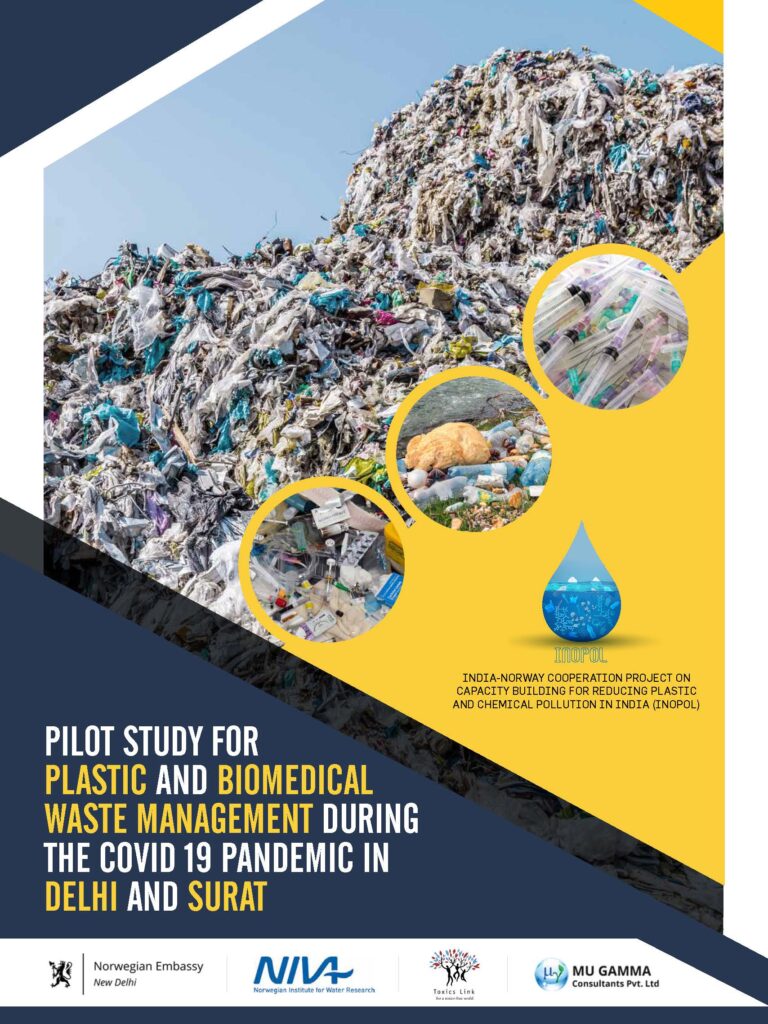
Pilot Study for Plastic and Biomedical Waste Management during the Covid 19 Pandemic in Delhi and Surat (INOPOL 2020)
Gender Reports
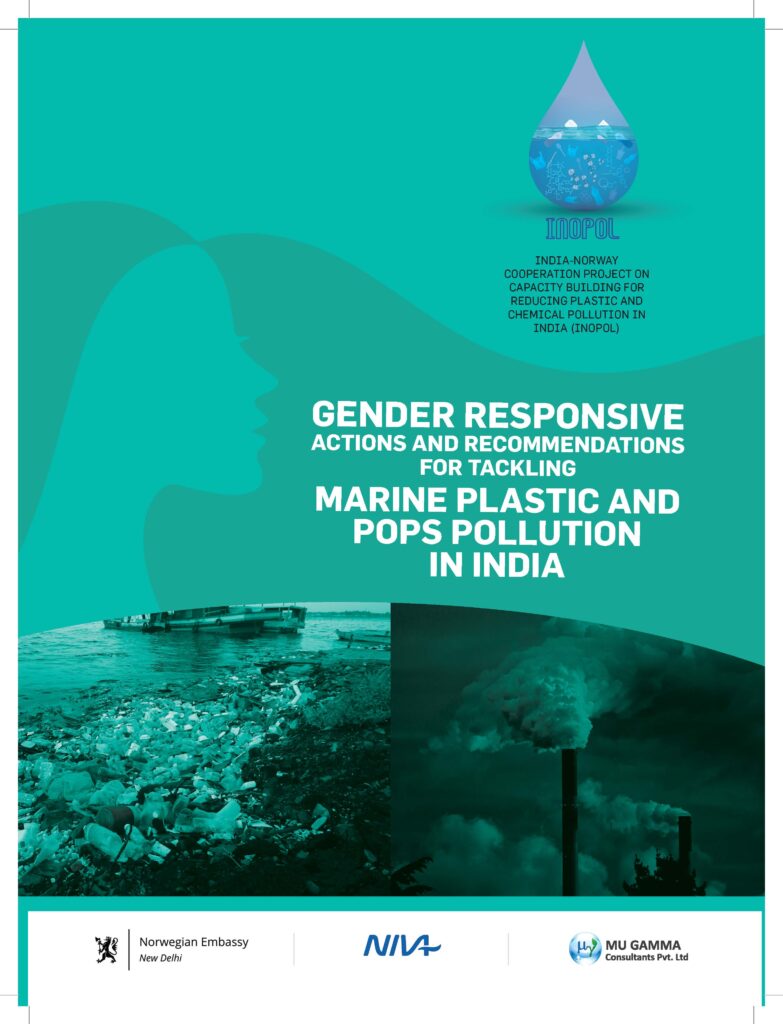
Gender Responsive Actions and Recommendations for Tackling Marine Plastic and POPs Pollution in India
2020 – 2021 Publications
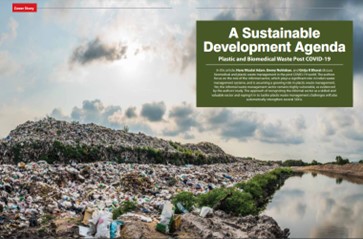
Adam, H. N., Noklebye, E. and Bharat, G. K. 2021. “A Sustainable Development Agenda: Plastic and Biomedical Waste Post COVID-19”. Terra Green 13 (11), pp. 22-28.
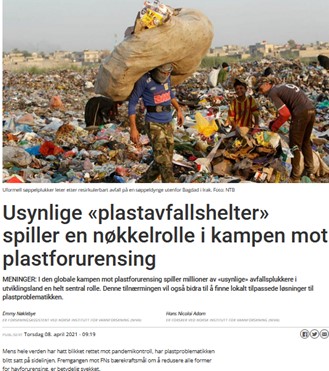
Noklebye, E. and Adam, H. 2021. “Usynlige «plastavfallshelter» spiller en nøkkelrolle i kampen mot plastforurensing”. Bistandsaktuelt. 8th April. https://www.bistandsaktuelt.no/arkiv-kommentarer/2021/usynlige-plastavfallshelter–i-kampen-mot-plastforurensing/
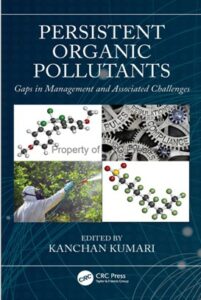
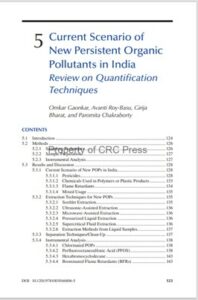
Book chapter: “Current scenario of new POPs in India: Data gaps and quantification techniques” by Omkar Gaonkar, Avanti Roy-Basu, Girija Bharat, Paromita Chakraborty. Accepted for publication. CRC Press. (Accepted).
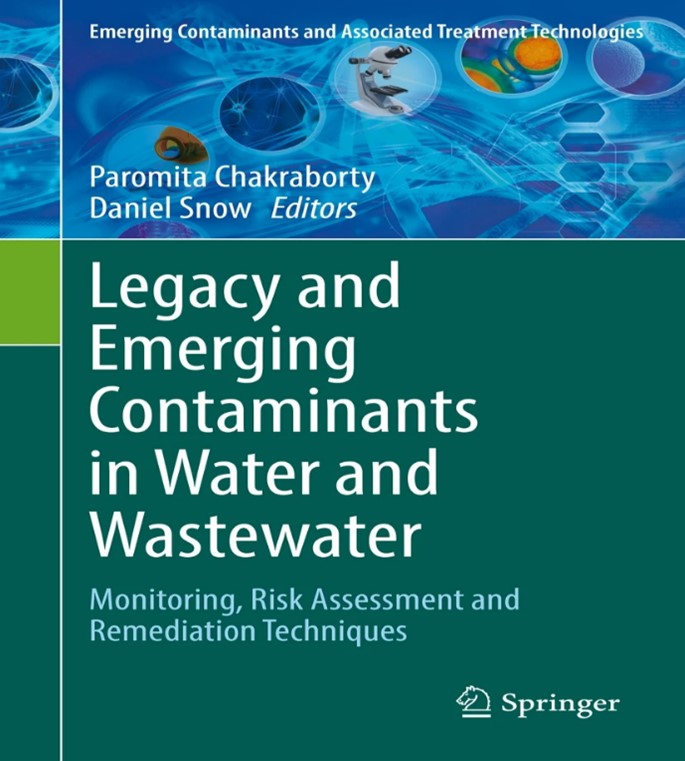
“A review on distribution and remediation techniques for perfluorinated compounds in water and wastewater” by Pavithra, Avanti Roy-Basu, Girija Bharat, Paromita Chakraborty, In Springer Germany.
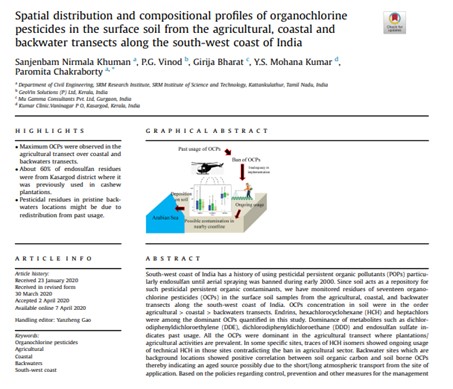
“Spatial distribution and compositional profiles of organochlorine pesticides in the surface soil from the agricultural, coastal and backwater transects along the south-west coast of India” by Sanjenbam Nirmala Khuman , P.G. Vinod , Girija Bharat , Y.S. Mohana Kumar, Paromita Chakraborty. Chemosphere. 254
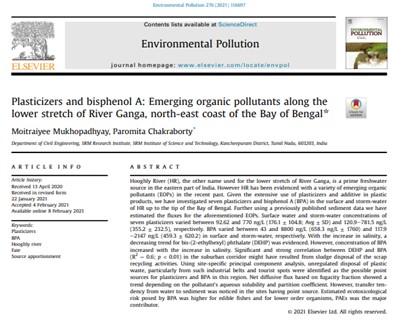
“Plasticizers and bisphenol A: Emerging organic pollutants along the lower stretch of River Ganga, north-east coast of the Bay of Bengal* by Moitraiyee Mukhopadhyay, Paromita Chakraborty. Environmental Pollution. 276 (2021) 116697.
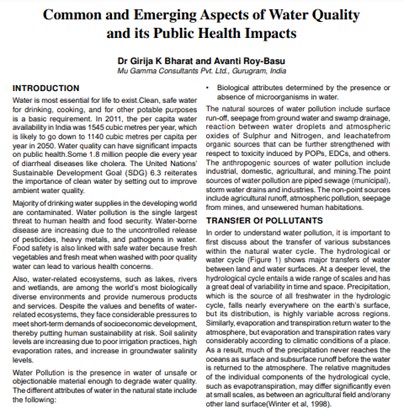
“Common and Emerging Aspects of Water Quality and its Public Health Impacts” by Dr Girija K Bharat and Avanti Roy-Basu. IWRA (India) Journal Volume 10, No. 1 January 2021.
2021 – 2022 Publications
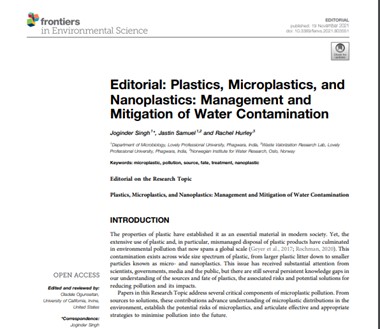
Singh, J., Samuel, J. and Hurley, R., (2021) ‘Plastics, Microplastics, and Nanoplastics: Management and Mitigation of Water Contamination’. Frontiers in Environmental Science, p.546.
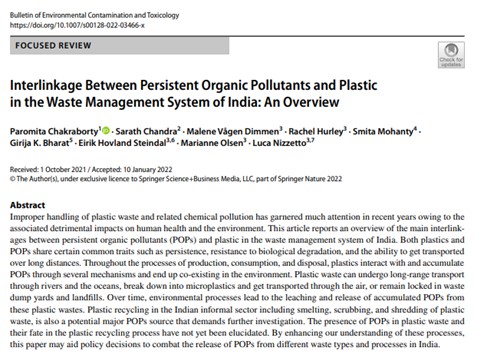
Chakraborty,P., Chandra. S., Dimmen, M.V., Hurley, R., Mohanty. S., Bharat, G.K., Steindal, E.H., Olsen, M., Nizzetto, L., “Interlinkage Between Persistent Organic Pollutants and Plastic in the Waste Management System of India: An Overview”. Bull Environ Contam Toxicol. 2022 Feb 18;1-10. doi: 10.1007/s00128-022-03466-x.
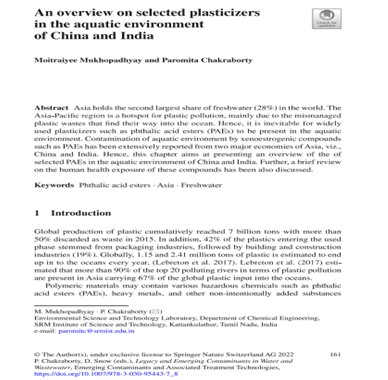
Moitraiyee Mukhopadhyay and Paromita Chakraborty*, Book Chapter, Selected Phthalic Acid Esters in the Aqueous Environment of Asian Countries: A Review on Fate and Distribution, Legacy and Emerging Contaminants in Water and Wastewater Monitoring, Risk Assessment and Remediation Techniques, Springer, Germany, Series ISSN 2524-6402
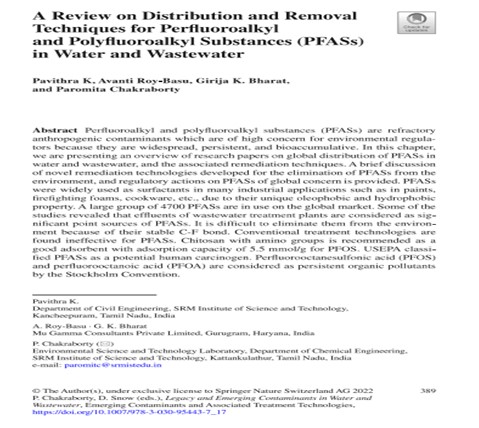
Kubendran Pavithra, Avanti Roy-Basu, Girija Bharat, Paromita Chakraborty*, Book Chapter, A review on distribution and removal techniques for perfluoroalkyl and polyfluoroalkyl substances (PFASs) in water and wastewater, Legacy and Emerging Contaminants in Water and Wastewater Monitoring, Risk Assessment and Remediation Techniques, Springer, Germany, Series ISSN 2524-6402.
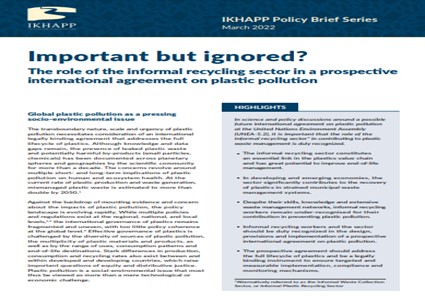
Adam, H.; Pille-Schneider, L.; Enge, C.; Nøklebye, E.; Bharat, K.; Abraham, M.; Dkhar, N. (2022) ‘Important but ignored? The role of the informal recycling sector in a prospective international agreement on plastic pollution’. IKHAPP Policy Brief Series. March. International Knowledge Hub Against Plastic Pollution. Available from: https://ikhapp.org/wp-content/uploads/2022/03/IKHAPP-Policy-Brief-informal-sector.pdf.
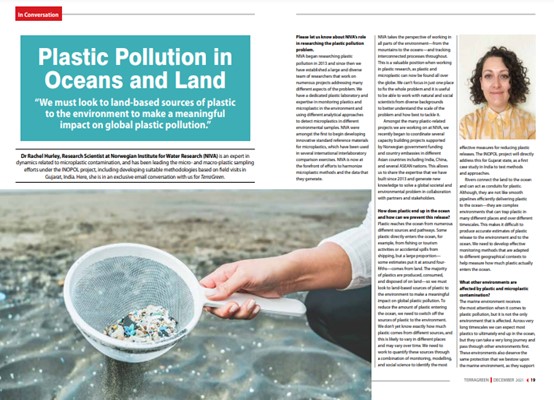
Rachel Hurley, In Conversation, TerraGreen, Volume 12, Issue 9, December, 2021.
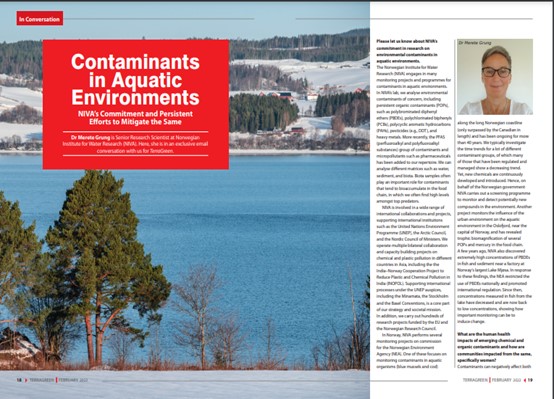
Merete Grung, In Conversation, TerraGreen, Volume 14, Issue 11, February, 2022.
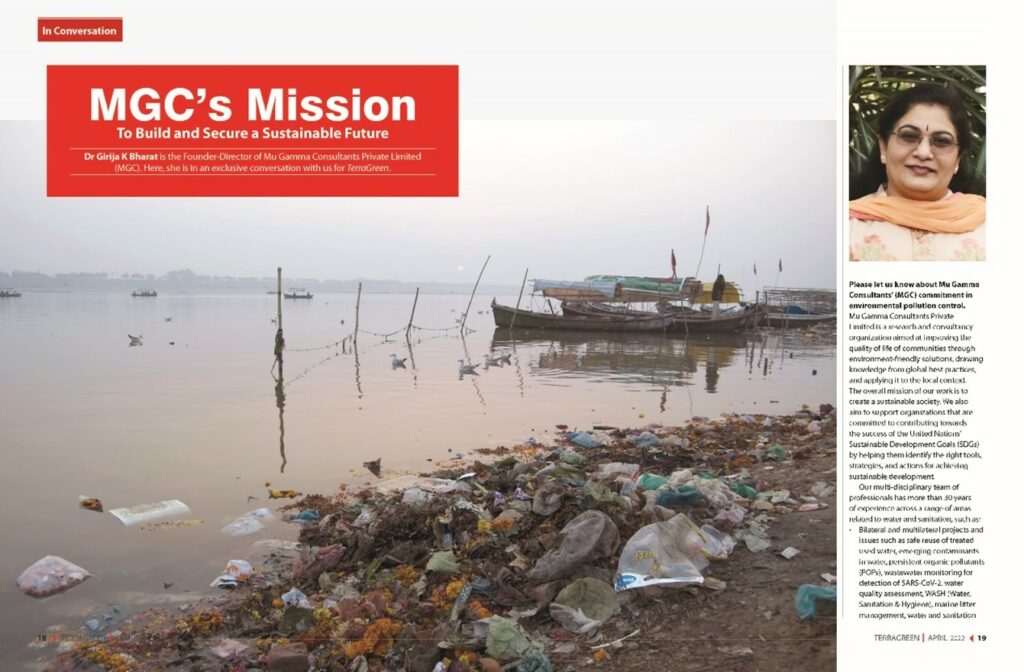
Girija Bharat, In Conversation, TerraGreen, Volume 17, Issue 14, May 2022
Paromita Chakraborty, Sarath Chandra, Avanti, Girija, Emmy “Chapter 3 – POPs Associated with Plastic Waste” Springer Germany Book, Laying the knowledge grounds for enhanced policy and management of Persistent Organic Pollutants (POPs) in India: In Press
Pavithra, Avanti, Kine, Girija, Paromita Chakraborty “Chapter 5 – Environmental Monitoring Techniques of Targeted POPs”Laying the knowledge grounds for enhanced policy and management of Persistent Organic Pollutants (POPs) in India Springer Germany Book, Laying the knowledge grounds for enhanced policy and management of Persistent Organic Pollutants (POPs) in India: In Press
Manisha, Girija, Malene, Ronnie Rex, Sarath Chandra, Paromita Chakraborty “Chapter 9 – Analysis of Gaps in Management of POPs in India ”Laying the knowledge grounds for enhanced policy and management of Persistent Organic Pollutants (POPs) in India: Springer Germany Book, Laying the knowledge grounds for enhanced policy and management of Persistent Organic Pollutants (POPs) in India: In Press
Girija, Avanti, Sarath Chandra, Ronnie Rex, Paromita Chakraborty, Abdullah, Suneel Pandey, Twinkle, Alka, Piyush “Chapter 10 – Case Studies-Tapi and Daman Ganga River Basins in Gujarat”Laying the knowledge grounds for enhanced policy and management of Persistent Organic Pollutants (POPs) in India: Springer Germany Book, Laying the knowledge grounds for enhanced policy and management of Persistent Organic Pollutants (POPs) in India: In Press
VamshiKrishna Gandla, Mounika Chiluka, Harish Gupta, Sukesh Narayan Sinha, Paromita Chakraborty “Occurrence, sources, and sediment-water exchange of pesticidal organochlorine pollutants in an urban tributary of the Krishna river, India” (Article submitted: with editor)
Publications in Progress
The INOPOL Technical Report on POPs Pollution has been accepted by Springer Nature for being published as a book.
Noklebye, E.; Roy-Basu, A.; Adam, H.N.; Bharat, G.; Steindal, E. (2022) [Under review] ‘Plastic bans in India – addressing the socio-economic and environmental complexities’. Journal of Cleaner Production.
Noklebye, E.; Adam, H. (2022) [in preparation] ‘Developing existing skills and waste networks of the informal recycling sector (IRS) towards increasingly equitable, robust, and sustainable plastic waste management solutions’.
Paromita Chakraborty, Harish Gadhavi Sarath Chandra, K Ronnie Rex , “Atmospheric legacy and new persistent organic pollutants in Indian cities during the Covid-19 pandemic-Levels, sources and time trends” (Article : In progress)

